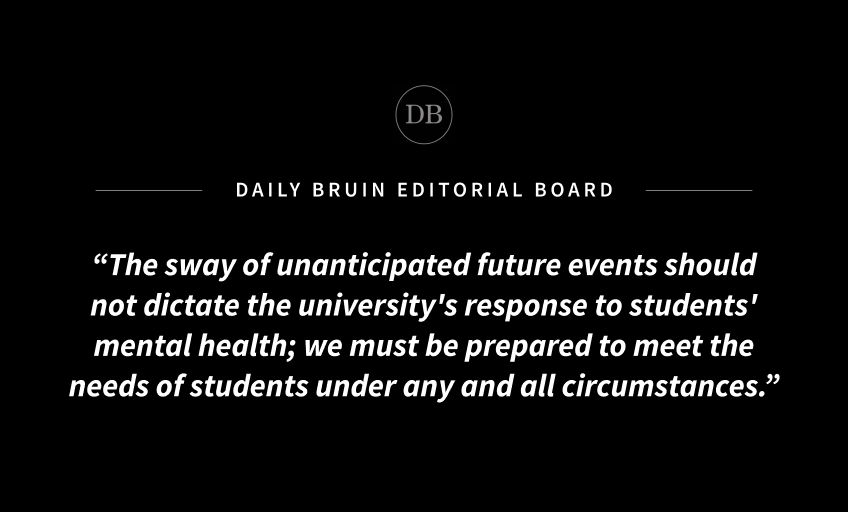Editorial: Tumultuous times call for comprehensive mental health resources

By Editorial Board
Feb. 6, 2022 9:10 p.m.
Editor’s note: Editorials are intended to serve as the jumping-off point, not the conclusion, to discussion. As part of the Daily Bruin’s commitment to its readers, the board hopes to present a responsible and clear analysis of relevant events and news items affecting the lives of those we serve, but our editorials are not representative of the Daily Bruin’s views on issues as a whole. We encourage all readers to reach out to our board members and to respond to our editorials.
This quarter has been stressful, to say the least.
In the span of five weeks, Bruins started classes online, returned to in-person learning and dealt with the threat of a mass shooting.
But the stress this quarter has brought is nothing new.
In the past 10 years, the rates of depression, anxiety and serious thoughts of suicide have doubled among college students, said UCLA health policy and management professor Daniel Eisenberg in an interview with The New York Times. Eisenberg is also the main investigator of a national mental health study.
The prevalence of mental health issues has only gotten worse with the COVID-19 pandemic and has very likely continued with the omicron variant.
According to the Center for Collegiate Mental Health at Pennsylvania State University, the greatest concern for college students seeking counseling during the pandemic is loneliness or isolation.
Meanwhile, suicides during the pandemic have heavily impacted students across the nation, leading to a noticeable increase in demand for counseling and mental health services. After a student’s suicide at Princeton University, the school saw a record 15% increase in demand, according to The New York Times.
When overworked college students are isolated from their communities and a normal college experience, it is crucial that counseling service providers fully understand the gravity of some students’ mental health issues and go above and beyond to meet demands.
Vice Chancellor of Student Affairs Monroe Gorden Jr. appeared to understand this concern when he promised in March not to reinstate UCLA Counseling and Psychological Services’ session limits in the fall.
Therefore, it was all the more disheartening to see CAPS reimpose session limits at the start of this school year and continue these limits during this tumultuous quarter.
Currently, students without a University of California Student Health Insurance Plan are limited to four to six sessions, while students with UC SHIP or as clinically indicated can receive between eight and 12 sessions, said UCLA spokesperson Katherine Alvarado in an emailed statement.
CAPS will monitor and adjust session limits to meet demand as well as work to reduce wait times, Alvarado added.
Now is not the time to monitor to see what happens when it comes to mental health. UCLA should proactively invest in the proper resources to be prepared for challenges that students might face. Unanticipated future events should not dictate the university’s response to students’ mental health; we must be prepared to meet the needs of students under any and all circumstances.
Students who need help with their mental health shouldn’t have to worry about sessions ticking down before they are left in the dust, nor should they deal with wait times.
According to a CAPS brochure, students who have reached their session limit are advised to connect with their primary insurance provider to find further treatment if needed. But this can leave students feeling discouraged from continuing, especially after already establishing a connection with a specific therapist. Going from one therapist to another and jumping through hoops to find affordable and accessible treatment – all the while juggling school and extracurriculars – is not fair for students.
It’s understandable if CAPS has limited capacity. However, it is UCLA’s duty to continue to pay attention to how strongly the pandemic has affected students’ mental health. Fall quarter may have seemed like the light at the end of the tunnel, but the rise in cases due to the omicron variant, among other challenges, has shown us the importance of remaining alert.
It’s a hard time for everyone right now. If anything, the pandemic should have shown that people should be more empathetic toward others.
Bruins need comprehensive mental health services and greater support from their university – before a bigger crisis happens.


